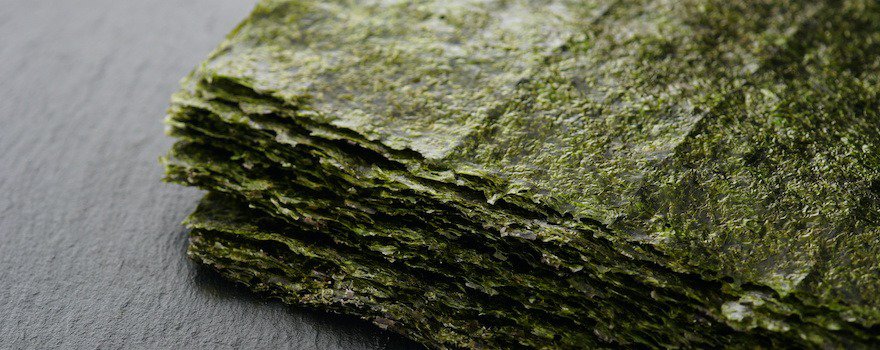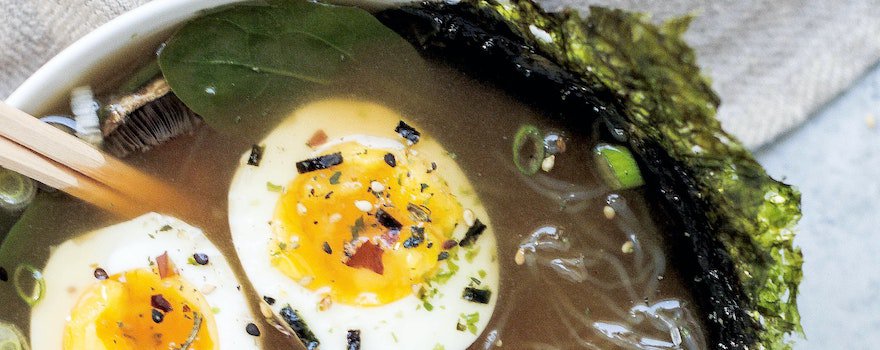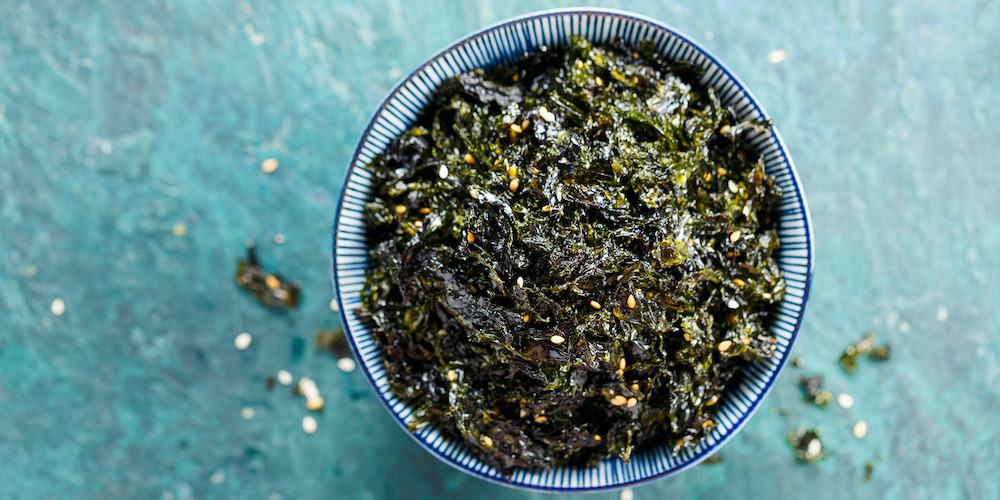BENEFITS OF NORI
✓ Source of plant-based proteins
✓ Source of antioxidants
✓ Boosts the immune system
✓ Source of vitamin B12
✓ Potentially anti-cancer
What is nori?
Nori, which means “seaweed” in Japanese, encompasses different species of edible red algae. These belong to the genus Porphyra and originate from Asia: China, Japan, Korea… Among the main cultivated varieties are Porphyra haitanensis, Porphyra tenera, and Porphyra yezoensis.
It grows in cold waters through photosynthesis. Depending on the variety, they can measure up to 60 cm long.
Once harvested, they are consumed fresh or used in the form of thin dried sheets. These sheets are known worldwide as they are used in making the famous Japanese sushi and maki.
They are also available in powder or flake form for seasoning dishes.
Like wakame, another Japanese seaweed, nori stands out for its great nutritional qualities. It is an excellent source of plant-based proteins and, to a lesser extent, of bioavailable vitamin B12. Interesting for vegetarians, this seaweed is also antioxidant, immune-stimulating, and potentially anti-cancer.
Nori is now one of the most consumed seaweeds in the world thanks to its presence in Japanese sushi and maki. In Japan, its cultivation is primarily located in the Saga region, along the Ariake Sea. Because it requires significant labor, its cultivation provides a livelihood for many producers in the region.
Nutritional composition
- Amino acids
- Vitamins: pro-vitamin A, B2, B3, B9, B12, C, E
- Minerals and trace elements: sodium, calcium, iron, zinc, phosphorus, potassium, iodine, manganese, copper
- Proteins
- Carbohydrates
- Fibers
- Fatty acids: omega 3
- Antioxidant actives: phenolic compounds, polysaccharides

The benefits of nori
🌿 Source of plant-based proteins
Nori seaweed is one of the best sources of plant-based proteins. For example, 100 g of dried nori contains about 36 g of protein. These are quality proteins that contain many amino acids: glycine, alanine, valine, tyrosine, phenylalanine, arginine…
This high content is particularly interesting for vegetarians, vegans, or those following a vegan diet. This seaweed meets the recommended daily protein needs and thus helps prevent deficiencies.
This review from Jiangsu University (China) details the nutritional composition of different nori algae varieties, notably their protein content.
🥝 Source of antioxidants
Nori seaweed contains many antioxidants, including phenolic compounds and polysaccharides. It notably contains fucoidan, a sulfated polysaccharide that traps free radicals and prevents their establishment in the body.
Additionally, it contains antioxidant nutrients like vitamin C and manganese, which protect cells against oxidative stress.
This study from Nagasaki University (Japan), conducted in a laboratory, investigated the antioxidant activity of porphyran, a polysaccharide extracted from nori.
🛡 Boosts the immune system
Nori seaweed appears to have a beneficial effect on the immune system. Its consumption stimulates macrophages (white blood cells), which constitute the first line of defense against infectious agents.
Additionally, the seaweed activates the NF-κB protein (nuclear factor-kappa B), which is involved in the immune response.
This study from the College of Medicine at Ulsan University (South Korea), conducted on mice, shows how nori activates the immune response.
👩🏻⚕️ Source of vitamin B12
Like Klamath, it contains vitamin B12. However, only dried nori contains bioavailable vitamin B12, which means it is assimilable and can be directly used by the body. This seaweed is therefore interesting for vegetarians and vegans, who should still adopt supplementation to avoid deficiencies.
This study from Hagoromo-gakuen College (Japan), conducted on rats, shows the bioavailability of vitamin B12 in dried nori.
🔬 Potentially Anti-Cancer
Thanks to its richness in antioxidant polysaccharides, nori exerts an anti-cancer effect. It has proven effective in slowing the growth of cancer cells. Additionally, it induces apoptosis, which is the programmed cell death of diseased cells. It therefore has strong potential for cancer prevention and treatment.
This study from Shantou University (China), conducted on human cells, demonstrates the anti-cancer effects of nori.

How to Consume Nori?
Fresh Nori Seaweed
You can find fresh nori seaweed in specialty stores, Asian groceries, or online. After harvesting, they are simply preserved in salt. Therefore, before consuming them, it is necessary to rinse and then desalt them in water for 10 minutes.
When cut into thin strips, fresh seaweed goes perfectly with salads, vegetables, rice, pasta, soups, and miso soup. It has a mild and fragrant flavor, between hazelnut and mushroom.
Dried Nori Sheets
This is the easiest format to find. After harvesting, nori seaweed is cut, pressed, and dried to obtain thin sheets. Depending on the varieties, the sheets take on a light green, dark green, or green-black color. Dark green is most often used to wrap maki while black is the rarest and most expensive.
You can use dried sheets to make your own Japanese sushi and maki. Slightly moisten them before making your rolls. The sheets can also be grilled, then they are called “Yaki Nori”. They add a spiced flavor to ramen, soba noodles, omelets, sauces… They can even be enjoyed as they are as an appetizer or snack during the day.

Sustainable Consumption: Favor Organic, Local, and Fair Trade Nori
✓ Alone, Japan produces around 400,000 tons of nori per year. Its cultivation extends to China, South Korea, but also in Europe, such as in Spain and France. It thrives particularly in the rocky areas of the Breton coasts where it grows wild. Harvested from November to April, the seaweed is then drained on racks.
✓ If you can, choose French-origin, wild, and hand-picked nori. If it comes from cultivation, prioritize organic and/or fair trade sources.
Dosage
It is recommended to consume 20 to 30 g of fresh seaweed per day. There is no real dosage for dried nori sheets. Just be careful not to eat them excessively.
Contraindications and Side Effects
Consumption of nori has some contraindications :
- Because it is naturally salty, individuals with high blood pressure should consume it in moderation
- Its consumption is not recommended for people with thyroid disorders, kidney failure, or heart disease
- Pregnant or breastfeeding women should consult their doctor before consuming it
Nori has very few side effects. Only excessive consumption can lead to undesirable effects on the kidneys, liver, and thyroid.
If you experience any side effects, stop your consumption and consult a doctor.
Report by Julia Perez
Sources and Scientific Studies
Jin Cao, Jianping Wang, Shicheng Wang, Ximing Xu, 2016. Porphyra Species: A Mini-Review of Its Pharmacological and Nutritional Properties.
Shogo Isaka, Kichul Cho, Satoru Nakazono, Ryogo Abu, Mikinori Ueno, Daekyung Kim, Tatsuya Oda, 2015. Antioxidant and anti-inflammatory activities of porphyran isolated from discolored nori (Porphyra yezoensis).
Ji-Hye Song, Hee-Bum Kang, Seung-Ho Park, Ji-Hoon Jeong, Jeongjin Park, Yanghee You, Yoo-Hyun Lee, Jeongmin Lee, Eungpil Kim, Kyung-Chul Choi, Woojin Jun, 2017. Extracts of Porphyra tenera (Nori Seaweed) Activate the Immune Response in Mouse RAW264.7 Macrophages via NF-κB Signaling.
S Takenaka, S Sugiyama, S Ebara, E Miyamoto, K Abe, Y Tamura, F Watanabe, S Tsuyama, Y Nakano, 2001. Feeding dried purple laver (nori) to vitamin B12-deficient rats significantly improves vitamin B12 status.
Wan-Zi Yao, Suresh Veeraperumal, Hua-Mai Qiu, Xian-Qiang Chen, Kit-Leong Cheong, 2020. Anti-cancer effects of Porphyra haitanensis polysaccharides on human colon cancer cells via cell cycle arrest and apoptosis without causing adverse effects in vitro.
P. Baweja, I. Levine, 2016. Seaweed in Health and Disease Prevention.



